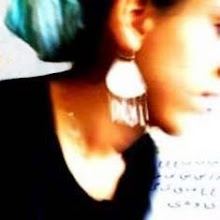Movement and Healing
I work in an education support program for high school students from a stigmatized neighbourhood of the city. Many of the students, who are mainly young people of color, (have) face(d) traumas rooted in both structural and interpersonal violence, including war, abuse, poverty, abandonment, racism, exile, to name a few. Knowing the cultural and economic realities of these young people's lives, many of them maintain silence around their traumas. Depression shows itself in different ways in every person, and it's difficult to know who is struggling with their mental health. Young people have a way of keeping things in, pushing them deep down somewhere, in hopes of burying. It's called survival. Keeping things moving. I know, because I did this. Those of us who could, kept it moving. As adults, we still do. But the buried stuff, they make their way up at some point. And movement becomes difficult, and in some cases, stifled.
Women of color make up the highest percentage of people struggling with depression (in the U.S. and Canada). We are more likely than white women to share socioeconomic realities that lead to depression, such as racial/ethnic discrimination, lower educational and income levels, segregation into low status and high-stress jobs, unemployment, single parenthood and so on. The impact of immigration and exile also furthers the level of depression in immigrant/refugee women of color. And our cultural perceptions of depression, often dismissive and negative, can prevent us from getting support. There's so much silence and stigma in our communities around the issue of mental health. And that silence can be detrimental.
I recently came across a website for an American based organization, mysistahs.org, created by and for women of color to provide info and offer support for young women on health issues, including depression. I'm having a hard time searching for a similar one here in Canada. I'm hopeful to find one. It's crucial for such spaces to exist for young people of color, girls and boys, who are struggling with traumas. Because while coping strategies keep things moving, there's always the need for support. No matter what.
Movement is imperative. But so is healing.
I work in an education support program for high school students from a stigmatized neighbourhood of the city. Many of the students, who are mainly young people of color, (have) face(d) traumas rooted in both structural and interpersonal violence, including war, abuse, poverty, abandonment, racism, exile, to name a few. Knowing the cultural and economic realities of these young people's lives, many of them maintain silence around their traumas. Depression shows itself in different ways in every person, and it's difficult to know who is struggling with their mental health. Young people have a way of keeping things in, pushing them deep down somewhere, in hopes of burying. It's called survival. Keeping things moving. I know, because I did this. Those of us who could, kept it moving. As adults, we still do. But the buried stuff, they make their way up at some point. And movement becomes difficult, and in some cases, stifled.
Women of color make up the highest percentage of people struggling with depression (in the U.S. and Canada). We are more likely than white women to share socioeconomic realities that lead to depression, such as racial/ethnic discrimination, lower educational and income levels, segregation into low status and high-stress jobs, unemployment, single parenthood and so on. The impact of immigration and exile also furthers the level of depression in immigrant/refugee women of color. And our cultural perceptions of depression, often dismissive and negative, can prevent us from getting support. There's so much silence and stigma in our communities around the issue of mental health. And that silence can be detrimental.
I recently came across a website for an American based organization, mysistahs.org, created by and for women of color to provide info and offer support for young women on health issues, including depression. I'm having a hard time searching for a similar one here in Canada. I'm hopeful to find one. It's crucial for such spaces to exist for young people of color, girls and boys, who are struggling with traumas. Because while coping strategies keep things moving, there's always the need for support. No matter what.
Movement is imperative. But so is healing.



2 Comments:
PQ,
I am glad you found mysistas. It is so important to know that you are not alone. As you wrote about the trauma people undergo and how they try to just keep moving, I was reminded of the film that I saw last night that I wanted to ask you about: Persepolis. Have you seen it? The main character struggles with depression because of exile, war, and political and social repression. I was wondering what you thought of it as you are also from Iran. I really liked it. I loved the animation and the story seemed very real to me. At many points, I was reminded of my friends in Lebanon who struggle with whether to leave or stay. Plus there is no time for processing all the violence people experience, witness or are afraid will occur. The movie also gave me a better sense of Iranian politics. I had always thought that it was an either or. Either you had been in support of the Shah or in support of Khomeini. Now I see that it is much more complicated.
i've read the graphic novels but haven't seen the movie yet! but going to. you said it so well,
"there is no time for processing all the violence people experience, witness or are afraid will occur." very true.
Post a Comment
<< Home